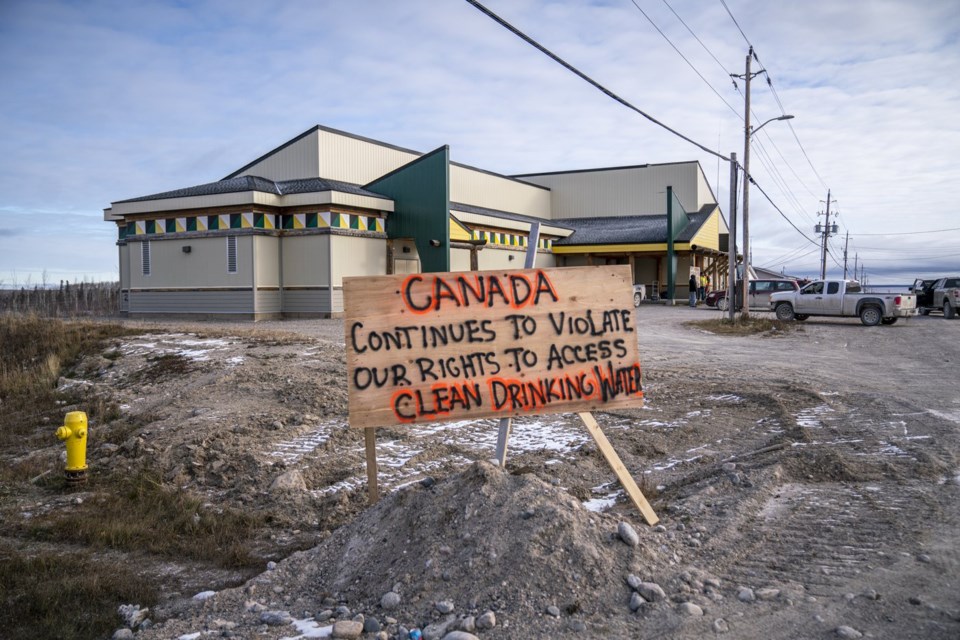THUNDER BAY – Indigenous Services Minister Patty Hajdu says a report from Ottawa’s financial watchdog on drinking water in First Nations shows signs her government has made real progress, while conceding it may also point to significant shortfalls.
The Thunder Bay-Superior North MP said the report from the Parliamentary Budget Office, released Wednesday, indicated the government has made a “focused and concerted effort” to ensure First Nations have access to clean drinking water.
The report found the government has now budgeted more than enough spending through 2026 to meet water and wastewater capital infrastructure needs on reserves with federally-supported systems.
However, it also found federal plans underfund operating and maintenance needs by around a third, or roughly $138 million a year.
“Overall, I think the PBO report was bordering on positive,” Hajdu said. “What it definitely showed was that there’s enough capital investment going toward water… and it will be sufficient to close the gap on the infrastructure side of things.”
However, she conceded the report also “highlighted a gap in operation and maintenance funding.”
Hajdu, who was appointed to the ministry just over a month ago following the federal election, said she hadn’t yet determined exactly what the estimated $138 million yearly shortfall involved.
“I’m going to dig into those numbers,” she said. “I want to understand a bit more what the PBO gap is pointing towards, so I can fight to close that gap.”
If operations and maintenance are not adequately funded, the PBO report found, it can put even relatively new infrastructure at risk of failure.
“As identified by the PBO, operation and maintenance shortfalls are a major contributor to water and wastewater treatment plant failures, which keep some communities in perpetual crisis,” said Grand Chief Derek Fox in a statement. “We acknowledge that this government is committed to resolving water issues in our communities, but the lack of funding for operation and maintenance must be addressed in the next budget.”
NAN’s 2018 infrastructure assessment found that funding only covers approximately 44 per cent of the costs of properly operating and maintaining infrastructure in NAN communities, Fox noted.
There are 13 long-term boil water advisories in effect across NAN territory, out of 43 remaining across 31 communities. That’s despite a Liberal promise in 2015 to resolve all 105 advisories in place when it took office by March of 2021.
Aaron Wesley, manager of technical services for Matawa First Nations Management, agrees a lack of operating funds is hobbling efforts to provide safe water.
“There is more spending” on water infrastructure in recent years, he said.
However, some of the expensive infrastructure remains out of commission. He believes that’s a symptom of a system that isn’t properly funding First Nations to manage their systems.
“A lot of support goes to design engineers, consultants, contractors – resources need to get to the First Nations to operate and maintain these facilities,” he said. “We need support for operator services for First Nations to help them transition, get their license, and make sure they’re ready to operate these facilities before we walk away. It’s not effective to build an $11 million water plant and just hand the keys over and walk away.”
“You need an implementation plan to make sure the First Nation is able to operate and maintain that facility with certified operators. Matawa provided a plan to do that. We haven’t really gotten the full support we need to help with that plan.”
Through a program called NIBI services, Matawa employs two water plant operators and a technician, who provide support and services for the nine First Nations the organization serves.
Matawa has submitted proposals to Indigenous Services Canada indicating the need for more funding, Wesley said, most recently a plan calling for a $2.5 million a year investment over five years.
The organization presently has a budget of $900,000 a year for water and wastewater operations and maintenance, which supports two water plant operators and one technician serving nine communities.
“We have a shortfall,” he said. “We need to be able to be in the communities more frequently, especially with these new water plants.”
The plan would provide full-time operator support in three First Nations Matawa considers “high risk,” to help them transition over five years to operate new water treatment plants, including training of in-house operators.
Wesley acknowledged positive steps by the current government, like a recent agreement to cover 100 per cent of operating and maintenance costs (up from 80 per cent).
Still, he said until Matawa’s First Nations have reliable drinking water, it’s difficult to be satisfied with the progress.
“We need to make sure that 100 per cent support meets the minimum requirements, and we question if it does,” he said.
Hajdu said she’s committed to ensuring First Nations have adequate funding.
“I’ve been very clear with leaders and with my team that if there’s a gap, we need to make sure there’s sufficient funding for operations and maintenance,” she said. “It’s my job to go after that money, and I will.”
“This is Canada, and everybody has the right to clean water,” she said. “Although there are obviously some technical challenges, especially with remote communities… Let me be clear: our goal as the government of Canada is to ensure everyone has clean drinking water, no matter where they live.”
